Cancer is Increasing:
World Cancer Day is observed every year on February 4th to raising awareness about cancer prevention, detection, and treatment. Cancer continues to be a major global health challenge affecting millions of people worldwide. In 2020, approximately approx. 2 crores new cancer cases were reported, leading to nearly 1crore deaths. The World Health Organization (WHO) projects that by 2040, the number of new cancer cases could increase significantly to 3 crores, largely due to an older population and various lifestyle factors.
- Breast cancer is the most diagnosed type, with over 2.3 million new cases.
- Lung cancer remains the leading cause of cancer-related deaths, accounting for 1.8 million fatalities.
- Other notable cancers include colorectal, prostate, and stomach cancers, which also contribute significantly to cancer incidence and mortality.
Impact of Early Intervention:
From 1975 to 2020, prevention, cancer screening and early treatment efforts have averted approx. 60 lac cancer deaths, accounting for an impressive 80% of all lives saved. Key Achievements in Cancer Prevention includes:
- Breast Cancer: Early detection and treatment saved 10 lac lives.
- Lung Cancer: Efforts like reducing tobacco use, low-dose CT screening, and early lobectomy contribute to 98% of drops in deaths.
- Cervical Cancer: Screening and treatment prevented 1.6 lac deaths.
- Colorectal Cancer: 9.5 lac lives were saved through early screening and treatment.
- Prostate Cancer: Regular screening and early treatment helped prevent 3.6 lac deaths.
These successes emphasize the crucial role of early detection and treatment in combating cancer. While most media focus on the rising cancer numbers on World Cancer Day, we’re turning our attention to raise awareness regarding best ways to overcome this challenging disease. Instead of just highlighting statistics, we’re aiming to inspire hope and action by emphasizing breakthroughs that truly make a difference.
Factors driving improvement in cancer survival:
Over 30% reduction in cancer-related deaths seen in last decades. What factors are contributing to these encouraging outcomes?
In most cases, significant improvements in cancer survival rates are due to surgery, with about 5-6% attributed to medicines and radiation therapy. Despite this, the media and society remain captivated by drugs, often labeling new treatments as “miracle cures” without examining their actual effectiveness. The best reported survival advantage is just 5% and this is only in those 20% of patients who respond.
The evidence is clear: early diagnosis through screening and prompt surgical treatment are crucial in combating cancer, especially for solid organ cancers. Effective treatment hinges on the complete removal of tumors with clear margins, often supplemented by chemotherapy and radiotherapy. For precancerous stage 0 and early stage 1 cancers, surgery alone is often sufficient.
The quality of surgical care is often assumed rather than guaranteed. However, evidence indicates that specialized oncologists can lead to better long-term outcomes for patients. Alarmingly, fewer than 25% of cancer patients receive timely and safe surgeries, according to the European Society of Surgical Oncology. While much research focused on improving surgical outcomes is conducted by surgeons, substantial resources continue to be allocated to medications that may not offer significant benefits. Recent discussions about cancer vaccines have underscored the need for clarification: these vaccines primarily serve as a form of secondary prevention and do not prevent cancer from developing. We must refocus on evidence-based practices that truly save lives: early detection and timely safe treatment.
When a 90-99% cure rate is possible for stage 1 cancer, why are resources not being redirected to build the infrastructure for cancer screening centers?
We need to make screening and early detection available to everyone, so that early treatment—which is the most effective and affordable—can be offered to all. This strategy would require fewer resources and is more cost-effective.
As cancer is on track to become the number one cause of mortality, why isn’t screening made mandatory, like vaccinations for children?
World Cancer Day Awareness:
On this World Cancer Day, under our ACT-EARLY campaign, our message is clear and our mission follows the 4T principle:
“TEST TIMELY – TREAT TIMELY ”
Early detection isn’t just a step; it’s a lifeline. With swift treatment, we don’t just fight cancer—we outsmart it.

To Know more about cancer:
To Know more about cancer:
Discover more from CancerSurgery
Subscribe to get the latest posts sent to your email.



